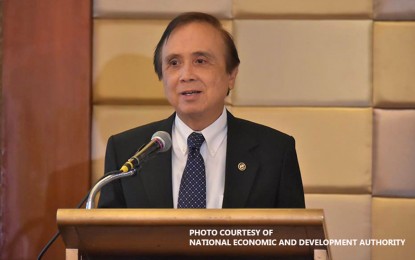
Socioeconomic Planning Secretary Ernesto Pernia (Photo courtesy of NEDA)
MANILA -- Socioeconomic Planning Secretary Ernesto Pernia on Thursday said the passage of an innovation measure promoting technological advancement can boost long-term growth, as the country undertakes various initiatives towards sustainable and inclusive development.
Pernia said the Philippine Innovation Act, which is awaiting the President’s signature, is expected to be passed into law “very soon”.
“NEDA (National Economic and Development Authority) will be drafting its Implementing Rules and Regulations (IRR) once the Innovation Act is signed,” he said during the European Innovation, Technology, and Science Center Foundation (EITSC) forum.
Pernia, also NEDA Director-General, said the Act champions the promotion of technological advancement in a bid to enhance the competitiveness of the local micro, small and medium enterprises (MSMEs).
“With science, technology, and innovation (STI) integrated into national programs and plans—referred to as STI ecosystem—our MSMEs may integrate more easily into domestic and global supply chains,” he added, noting science and technology is key to making the Philippines a more competitive player in the global knowledge arena.
The NEDA chief cited the Philippine Development Plan (PDP) stipulating the need to vigorously advance STI so the country can readily respond to and thrive in the Fourth Industrial Revolution, or Industry 4.0.
Pernia also underscored other government programs and policies to achieve inclusive and sustainable growth, which requires the engagement of all stakeholders or a “whole-of-society approach”.
He said the Philippine Development Plan (PDP), the country’s blueprint for development, is anchored on the Sustainable Development Goals of the United Nations, and on the 0-10 points Socioeconomic Agenda of the Duterte administration.
Pernia further cited the country’s Conditional Cash Transfer program, in which both private and non-government organizations are tapped to provide alternative modes of education.
He said another example is the Expanded Maternity Leave Act, which extends maternity leave benefits from 60 to 105 days.
“While the law’s passage was mostly the doing of government, we are counting on the private sector to implement non-discrimination laws such as this, to ensure that women receive equal opportunities in the workplace (if not at home),” Pernia said.
Other policies consistent with inclusive practices include the Ease of Doing Business Act, the Community Empowerment through Science and Technology Program, OneStop Lab, and One Expert Program that help local communities and MSMEs find gainful employment, he added. (PNA)
